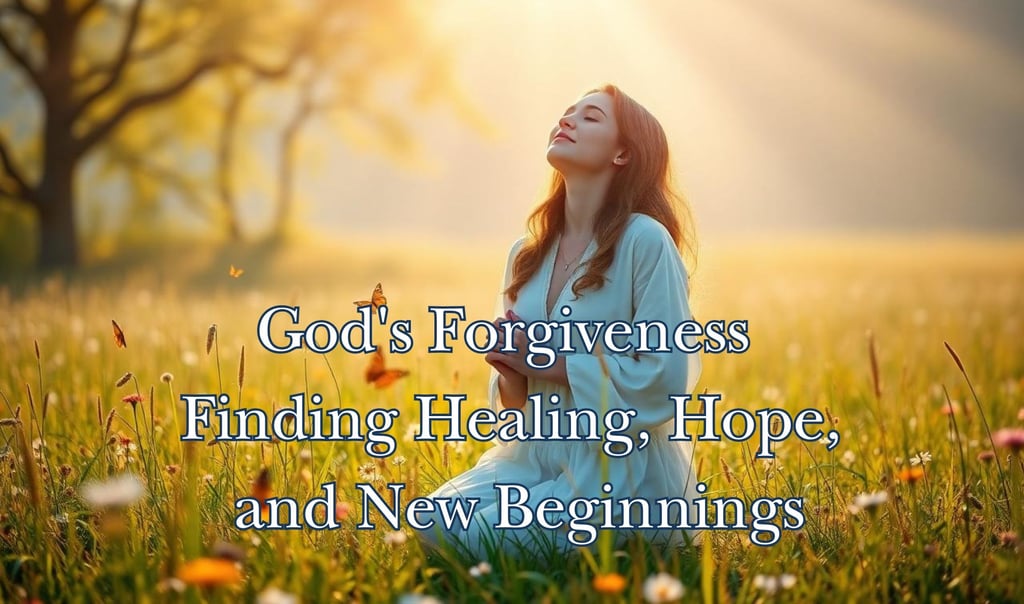God's Forgiveness: Finding Healing, Hope, and New Beginnings
Experience God's Forgiveness in a way that feels close and real. Find hope, healing, and the quiet strength to start fresh each day.
FAITH & SPIRITUALITY
Shari Smith
5/21/202511 min read
As an Amazon affiliate, we earn commissions at no extra cost to you if you click our links and make a purchase.


There's something quietly comforting in the idea of god's forgiveness.
For me, it’s been a soft place to land when I’m feeling the weight of regret or shame.
A lot of us carry stories we wish we could rewrite—moments when we missed the mark, hurt someone, or lost our way.
In those cracks and creases of our lives, forgiveness isn’t just a word; it’s hope.
God's forgiveness matters because it offers a fresh start, no matter what our past looks like.
It’s the chance to let go of old hurts and self-blame, stepping into a new story with kindness—for ourselves and others.
Understanding this kind of grace can change how we see ourselves.
It helps us believe that healing is possible, even when we think we've messed up too much.


Understanding the Nature of God's Forgiveness
Looking closer at god's forgiveness, I see both mystery and mercy at work.
This isn't just a topic for scholars or theologians—it's a living truth that we bump into in quiet prayers, Sunday sermons, or in the quiet after we mess up.
For anyone who’s ever whispered sorry into the universe, wondering if a second chance is really possible, exploring how god's forgiveness works can open doors to hope and healing.


Whether we come from deep faith or honest curiosity, understanding this big idea often changes how we see ourselves and others. Here’s how I break it down.
Defining God's Forgiveness
At its core, god's forgiveness is the act of letting go of wrongs—completely and without holding back.
When I talk about this, I notice a key difference between how humans forgive and how god forgives.
Human forgiveness: Most of us forgive with limits. Maybe we need time. Sometimes, we forgive but still carry hurt or keep our guard up.
God's forgiveness: This is different. It’s described as unlimited, unconditional, and completely free. God doesn't just set hurt aside—he removes it, almost like cleaning a slate so thoroughly that nothing is left behind.
God’s forgiveness isn’t earned. I don’t have to do a certain number of good deeds or say certain words to receive it.
It’s offered because of who god is: patient, gracious, and deeply loving.
For me, that means there’s no mistake too big, no failure too final, to put me out of reach of god’s mercy.

WILL GOD FORGIVE ME Inspirational & Motivational
Watch Video...
Biblical and Scriptural Foundations
The Bible is full of stories and promises about god’s forgiveness.
These passages reassure me (and many others) that forgiveness is more than an idea; it’s something god does again and again.
The Prodigal Son (Luke 15:11-32): This parable tells of a son who wastes everything and comes crawling back home, afraid and ashamed. His father’s arms are open, ready to welcome him, no questions asked. I see myself in that son sometimes—uncertain, yet always welcomed.
Psalm 103:8-12: Here, the psalmist writes, "The Lord is compassionate and gracious, slow to anger, abounding in love...as far as the east is from the west, so far has he removed our transgressions from us." These words paint a picture of forgiveness that is complete and without end.
Jesus on the Cross (Luke 23:34): In the middle of deep pain, Jesus says, "Father, forgive them, for they know not what they do." Even in suffering, forgiveness flows.
These examples show god’s forgiveness isn’t a rare event. It’s part of his heartbeat for people—a steady promise that meets us where we are.
God's Forgiveness in Other Major Religions
Christianity isn’t the only faith tradition that holds forgiveness at its heart. When I explore other beliefs, I find echoes and new shapes to this theme.
Judaism: Forgiveness in Judaism is both personal and communal. During Yom Kippur, the Day of Atonement, Jews seek both god’s forgiveness and forgiveness from people they’ve wronged.
God’s mercy is near, but confession, making things right, and personal change are key parts of the process.
The focus is on turning back, or teshuva—returning to god with honesty and hope.
Islam: In Islam, god (Allah) is often called "The Most Merciful." Forgiveness is central, offered freely to anyone who repents sincerely. The Qur’an repeats that Allah’s mercy outweighs his wrath, and seeking forgiveness is encouraged daily.
There’s a strong sense that nobody is too far gone for god’s love to reach.
Looking at these traditions, I feel reassured. Across faiths, god’s forgiveness is wide, warm, and available. Whether I use the word grace, mercy, or compassion, the invitation is there: to be honest, to seek forgiveness, and to trust that a new start is possible.
The Process of Experiencing God's Forgiveness
Experiencing god’s forgiveness often feels like sorting through a tangled drawer, pulling out old hurts and regrets, and holding them up to the light.
It’s never easy, but I’ve found that each step brings honesty, relief, and the gentle promise of change.
The process is personal, messy, and in many ways, life-changing.
Here’s how I’ve learned to walk through it, step by step.


Repentance and Confession
The first step in experiencing god’s forgiveness is often the hardest: acknowledging what went wrong.
For me, repentance isn’t about getting the words just right or saying a special prayer. It’s about turning around—changing direction with my heart and actions.
When I repent, I stop trying to hide or excuse my mistakes. I let the truth sink in, no matter how uncomfortable. Honest confession follows.
I talk to god as I would a close friend. Usually, it sounds like, “This is what I did. I know it was wrong. I want to change.”
Sometimes I write it down or say it quietly out loud, just to make sure I’m not shoving it under the rug.
Here’s what helps me with repentance and confession:
Take real inventory: I pause and notice what’s weighing on my heart.
Speak honestly: I skip fancy words and just say what I mean.
Own my part: I stop blaming others or offering excuses.
I think confession is freeing. Letting it out can feel raw at first, but then I usually notice the tightness in my chest ease up.
God meets honesty with mercy—every time.
Faith and Acceptance
After confession, the next step asks me to trust. I have to believe that god’s forgiveness is as real as the sunrise, even if I don’t feel different right away.
Faith steps in where my feelings can’t go. I remind myself that god’s mercy isn’t tied to how worthy I feel.
Sometimes, accepting forgiveness feels a lot like opening the door to someone I thought might be angry with me—only to find patient, open arms instead.
I let myself be forgiven. That’s not always easy.
There are days when regret tries to stick around, whispering that I’m still not enough. But faith says otherwise:
God’s promise stands, even when I’m unsure.
Forgiveness is a gift, not a reward I earn.
I’m not alone—many people, throughout history, have felt unworthy of god’s forgiveness and still received it.
When I trust in god’s forgiveness, I practice letting go of guilt. I don’t let my past call all the shots anymore.
Transformation and Renewal
Once I accept god’s forgiveness, something shifts inside me. It’s not instant—more like gentle waves reshaping the shore over time.
God’s forgiveness opens the door to real change. The shame that held me back starts to fade, and more room opens up for kindness, both toward myself and others.
This is where personal growth begins to take root. I notice changes in how I think, act, and respond:
I react to setbacks with more patience.
I’m slower to judge others, knowing how much grace I’ve been given.
I lean into hope, not despair, when I mess up again.
The process is ongoing. I see god’s forgiveness as fuel for transformation—he doesn’t just clean the slate, he helps me write a better story going forward.
Each fresh start carries me closer to peace, wholeness, and a deeper kind of joy.
Overcoming Barriers to Accepting God's Forgiveness
Even when I believe god’s forgiveness is real, there are moments when old guilt, shame, and self-doubt try to block the sun.
These feelings sneak in, convincing me that forgiveness might be for others, but not for me—at least, not this time.
I’ve found that these barriers are pretty common, and they show up for so many of us, no matter how much faith or experience we have.


The path to truly accepting god’s forgiveness gets smoother when we name these struggles and learn gentle ways to move past them.
Dealing with Guilt and Shame
Guilt and shame can feel like heavy backpacks we forget we’re carrying.
Even after asking for god’s forgiveness, I sometimes catch myself replaying mistakes like scratchy records.
If you know that feeling, you’re not alone.
Here’s what helps me let go, layer by layer:
Remember the promise: God’s forgiveness isn’t partial. When I say sorry and mean it, the slate is wiped clean—no hidden record, no secret list of wrongs.
Practice self-compassion: I try to speak to myself the way I’d talk to a close friend. If I wouldn’t shame someone else for their mistakes after they’ve made amends, I don’t need to shame myself.
Limit rumination: When memories loop in my head, I picture handing them over. Sometimes I write them down and tear up the page, as a way of saying, “This doesn’t own me anymore.”
Lean into safe community: Talking to a trusted friend, counselor, or faith leader about old guilt often breaks its grip. Bottling it up makes it worse.
Letting go is a practice. Some days, I have to remind myself many times that god’s forgiveness is stronger than my worst day.
Guilt may visit, but I don’t have to let it move in and unpack.
Breaking the Cycle of Self-Doubt
Self-doubt creeps in quietly, whispering that I’m not worthy of a second chance—that maybe god’s forgiveness stops at my doorstep. Doubt feeds on isolation and comparison. If this is familiar, I get it.
Here are ways I untangle the knot of unworthiness:
Accept that feelings aren’t facts: Just because I feel unworthy doesn’t mean it’s true. God’s forgiveness isn’t about how I feel in a moment; it’s about grace offered freely, no matter the size of my mistakes.
Read and repeat truth: Sometimes, I need to see god’s promises in black and white. Verses or reminders about forgiveness can serve as anchors when I get tossed by doubt.
Celebrate progress, not perfection: Growth is messy. I try to notice even the smallest steps forward and give myself credit. God values honest effort over flawless living.
Ask for help: When self-doubt gets loud, reaching out to someone who understands faith and struggle can make all the difference. Sometimes I need encouragement from others to believe that god’s forgiveness is as wide as everyone says.
Breaking out of self-doubt isn’t about finding the perfect advice. It starts with one honest choice after another: to believe I am forgiven, to live like it’s true, and to reach for hope instead of shame.
Every time I take that small step, I remember god’s forgiveness meets me exactly where I am, and moves with me toward new beginnings.
The Impact of God's Forgiveness on Personal Relationships
When I talk about god's forgiveness, I'm not just thinking about my own peace and fresh starts.
The ripple effects spill over into my closest relationships—sorting out old hurts, building trust, and growing real connection.
The way I take in forgiveness from god often shapes how I treat others and, honestly, how I treat myself on the hardest days.
Here’s how those gentle currents work in everyday life.


Learning to Forgive Others
I used to think letting go meant forgetting or pretending nothing happened. But as I started to understand god’s forgiveness, I realized there’s a different way.
God forgives without holding things over my head—he wipes the slate clean, no grudges, no scorekeeping.
This kind of forgiveness changes how I look at people who've let me down. When I soak in god’s patience with me, it’s easier to show patience to someone else.
If god doesn’t keep a running list of my mistakes, maybe I don’t need to keep one for others, either.
Here's what I've noticed happens when god's forgiveness shapes my reactions:
Judgment softens: I’m less likely to judge others harshly, because I know what it’s like to be forgiven.
Boundaries become healthy: Forgiving doesn’t mean I become a doormat. It means I can let go of bitterness, even if trust needs rebuilding.
Relationships heal faster: Saying “I forgive you” can lift a heavy weight from both shoulders.
Kindness replaces payback: I want to act with the same grace I’ve been offered.
Forgiving someone who hurt me doesn't always come quickly.
Sometimes it takes a few tries, a few honest prayers, and reminders that I’m not doing it alone.
But every step draws me closer to real peace, and it gives both me and the other person a chance to grow.
Self-Forgiveness and Healing
Accepting forgiveness from god isn’t just about what happens between me and others—it shapes the way I look at myself when I’ve messed up.
Some days, the hardest person to forgive is the one in the mirror. I hold onto mistakes, replaying them, believing I should have done better.
But god's forgiveness sets a foundation I can stand on. If god—who knows every hidden motive and every angry word—says I’m still loved and wanted, then who am I to argue?
This foundation opens the door to real healing:
Shame loosens its grip: When I let god’s forgiveness sink in, shame starts to shrink.
Honesty gets easier: I can admit my mistakes without fear.
Growth feels possible: I believe in a future that isn’t held hostage by my past.
Self-acceptance grows: I start to see myself the way god does—flawed, but valuable.
Sometimes, self-forgiveness means repeating god’s promises until they start to feel true. I’ll whisper reminders to myself or write them down:
“I am forgiven.”
“My past does not define me.”
“God’s mercy is enough.”
Healing doesn’t always arrive in a rush. For me, it comes in gentle moments—an easy breath after an honest prayer, a moment of quiet after a restless night.
When I stop fighting with myself and accept that god’s forgiveness really covers me, I find space to become new again.
And from that place of peace, I can give others the same grace I’ve learned to accept.
Conclusion
God's forgiveness has shaped my story in quiet, steady ways.
Letting myself receive that forgiveness has brought deep relief—a gentle invitation to move forward lighter, not held back by old mistakes or heavy shame.
When I trust this gift, I start to see fresh hope, healing, and the chance to grow into someone new.
If you’re sitting with regret or wishing for a clean slate, know that god’s forgiveness is already reaching toward you.
Accepting it can be the first step to real change and lasting peace.
Thank you for sharing this space with me. If something here sparked hope or a new thought, I hope you’ll let it grow.
You’re welcome to share your own story or steps with me—I’m always listening.




